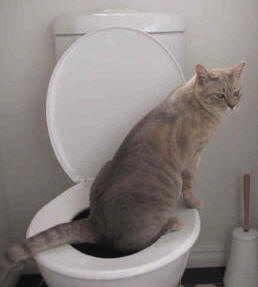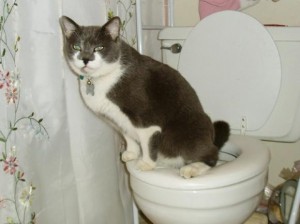Dangers of Disposing Cat Poop in Your Toilet - Preventive Steps
Dangers of Disposing Cat Poop in Your Toilet - Preventive Steps
Blog Article
Here down the page you might get a lot of worthwhile news with regards to Don’t flush cat feces down the toilet.

Intro
As pet cat owners, it's essential to bear in mind how we throw away our feline good friends' waste. While it might seem convenient to purge pet cat poop down the toilet, this practice can have detrimental consequences for both the setting and human wellness.
Alternatives to Flushing
Fortunately, there are much safer and a lot more responsible ways to get rid of feline poop. Consider the adhering to options:
1. Scoop and Dispose in Trash
One of the most usual technique of dealing with feline poop is to scoop it into a naturally degradable bag and toss it in the garbage. Make sure to utilize a committed trash scoop and deal with the waste quickly.
2. Use Biodegradable Litter
Opt for eco-friendly cat trash made from materials such as corn or wheat. These litters are eco-friendly and can be securely dealt with in the garbage.
3. Bury in the Yard
If you have a yard, take into consideration hiding cat waste in a designated area away from veggie yards and water resources. Be sure to dig deep adequate to avoid contamination of groundwater.
4. Install a Pet Waste Disposal System
Buy a pet dog garbage disposal system especially designed for pet cat waste. These systems utilize enzymes to break down the waste, decreasing odor and environmental effect.
Health Risks
Along with environmental worries, purging feline waste can also pose wellness risks to human beings. Pet cat feces might contain Toxoplasma gondii, a bloodsucker that can cause toxoplasmosis-- a possibly extreme health problem, especially for pregnant ladies and people with damaged body immune systems.
Ecological Impact
Flushing feline poop introduces harmful pathogens and bloodsuckers right into the supply of water, presenting a significant danger to marine environments. These contaminants can negatively influence marine life and compromise water quality.
Verdict
Liable family pet possession extends past offering food and shelter-- it likewise includes proper waste management. By avoiding flushing cat poop down the bathroom and going with alternate disposal approaches, we can lessen our environmental impact and safeguard human health and wellness.
Why Can’t I Flush Cat Poop?
It Spreads a Parasite
Cats are frequently infected with a parasite called toxoplasma gondii. The parasite causes an infection called toxoplasmosis. It is usually harmless to cats. The parasite only uses cat poop as a host for its eggs. Otherwise, the cat’s immune system usually keeps the infection at low enough levels to maintain its own health. But it does not stop the develop of eggs. These eggs are tiny and surprisingly tough. They may survive for a year before they begin to grow. But that’s the problem.
Our wastewater system is not designed to deal with toxoplasmosis eggs. Instead, most eggs will flush from your toilet into sewers and wastewater management plants. After the sewage is treated for many other harmful things in it, it is typically released into local rivers, lakes, or oceans. Here, the toxoplasmosis eggs can find new hosts, including starfish, crabs, otters, and many other wildlife. For many, this is a significant risk to their health. Toxoplasmosis can also end up infecting water sources that are important for agriculture, which means our deer, pigs, and sheep can get infected too.
Is There Risk to Humans?
There can be a risk to human life from flushing cat poop down the toilet. If you do so, the parasites from your cat’s poop can end up in shellfish, game animals, or livestock. If this meat is then served raw or undercooked, the people who eat it can get sick.
In fact, according to the CDC, 40 million people in the United States are infected with toxoplasma gondii. They get it from exposure to infected seafood, or from some kind of cat poop contamination, like drinking from a stream that is contaminated or touching anything that has come into contact with cat poop. That includes just cleaning a cat litter box.
Most people who get infected with these parasites will not develop any symptoms. However, for pregnant women or for those with compromised immune systems, the parasite can cause severe health problems.
How to Handle Cat Poop
The best way to handle cat poop is actually to clean the box more often. The eggs that the parasite sheds will not become active until one to five days after the cat poops. That means that if you clean daily, you’re much less likely to come into direct contact with infectious eggs.
That said, always dispose of cat poop in the garbage and not down the toilet. Wash your hands before and after you clean the litter box, and bring the bag of poop right outside to your garbage bins.
https://trenchlesssolutionsusa.com/why-cant-i-flush-cat-poop/

I ran across that page about Don’t flush cat feces down the toilet while doing a search on the web. In case you liked our page kindly don't forget to share it. I thank you for reading our article about How to Dispose of Cat Poop and Litter Without Plastic Bags.
Go Services Report this page